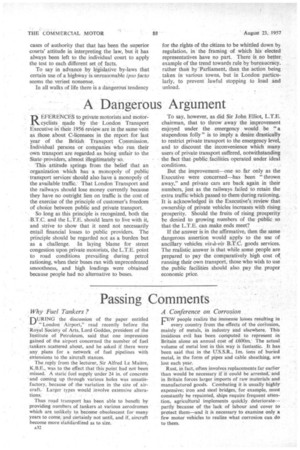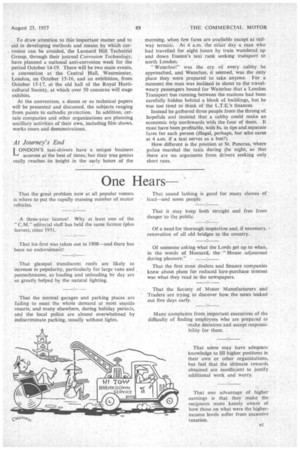Passing Comments
Page 34

Page 35

If you've noticed an error in this article please click here to report it so we can fix it.
Why 'Fuel Tankers?
FILMING the discussion of the paper entitled London Airport," read recently before the .Royal SkietY of Arts, Lord Geddes, president of the Institute of Petroleum, said that one impression gained of the airport Concerned the number of fuel ,tankers scattered .about, and he asked if there were any plans for a network of fuel pipelines with extensions to the aircraft stances.
The reply from the lecturer, .Sir Alfred Le Maitre, .K.B.E., was to the effect that this point had not been missed. A static fuel supply under 24 in. of concrete and coming up through various holes was unsatisfactory, because of thevariation in the size of aircraft. Larger types would involve extensive alterations.
Thus road transport has been able to benefit by providing numbers of tankers at various aerodromes which are, unlikely to become obsolescent for many years to come, and certainly not until, and if, aircraft become more 'standardized as to size.
A32
A Conference on Corrosion
FENNI people realize the immense losses resulting in every country from the effects of the corrosion, mainly of metals, in industry and elsewhere. This insidious evil has been computed to represent in' Britain alone an annual cost of f600m.' The actual volume of metal lost in this way is fantastic. It has been said that in the U.S.S.R., lm. tons of buried metal, in the form of pipes and cable sheathing, are lost each year.
Rust, in fact, often involves replacements far earlier than would be necessary if it could be arrested, and in Britain forces larger imports of raw materials and manufactured goods. Combating it is usually highly expensive; iron and steel bridges, for example, must constantly be repainted, ships require frequent attention, agricultural implements quickly deteriorate— partly because of the lack of labour and cover to protect them—and it is necessary to examine only a few motor vehicles to realize what corrosion can do to them. To draw attention to this important matter and to aid in developing methods and means by which corrosion can be avoided, the Leonard Hill Technicral Group, through their journal Corrosion Technology, have planned a national anti-corrosion week for the period October 14-19. There will be two main events, a convention at the Central Hall, Westminster, London, on October 15-16, and an exhibition, from October 15-17, at the old hall of the Royal Horticultural Society, at which over 50 concerns will stage exhibits.
At the convention, a dozen or so technical papers will be presented and discussed, the subjects ranging from paints to cathodic protection. In addition, certain companies and other organizations are planning ancillary activities of their own, including film shows, works tours and demonstrations.
At Journey's End
ONDON'S taxi-drivers have a unique business " acumen at the best of times; but their true genius really reaches its height in the early hours of the morning, when few fares are available except at railway termini. At 4 a.m. the other day a man who had travelled for eight hours by train wandered up and down Euston's taxi rank seeking transport to north London.
"Waterloo!" was the cry of every cabby he approached, and Waterloo, it seemed, was the only place they were prepared to take anyone. For a moment the man was inclined to shout to the travelweary passengers bound for Waterloo that a London Transport bus running between the stations had been carefully hidden behind a block of buildings, but he was too tired to think of the L.T.E.'s finances.
Instead he gathered three people from the throng of hopefuls and insisted that a cabby could make an economic trip northwards with the four of them. It must have been profitable, with 8s. in tips and separate fares for each person (illegal, perhaps, but who cares at 4 a,m. if a taxi serves as a bus?).
How different is the position at St. Pancras, where police marshal the taxis during the night, so that there are no arguments from drivers seeking only short runs.




































































































